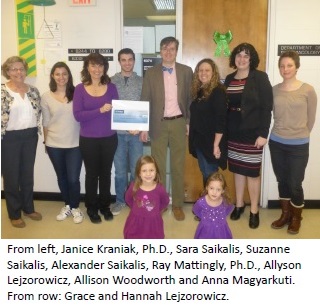
Organizers of a local effort to raise awareness and funds to combat Neurofibromatosis recently presented a Wayne State University School of Medicine researcher with a check to support his work to develop effective drug treatments for the condition.
Members of the family of Sara Saikalis, Allyson Lejzorowicz and Allison Woodworth, members of NF Michigan, presented Raymond Mattingly, Ph.D., professor and chair of Pharmacology, with a check for $25,000 to support his research. The money comes from proceeds of last summer's sixth annual Great Steps for NF Walk, held at West Bloomfield High School. The walk raises awareness about the disease, with funds going to support NF research.
The Saikalis family and Lejzorowicz organized the local walk. Woodworth represents NF Michigan.
Neurofibromatosis, or NF, consists of genetic disorders that cause tumors to grow in the nervous system. According to the National Institute of Neurological Disorders and Stroke, the tumors grow in cells of nerves and the myelin sheath that wraps around nerves. Tumors grow on nerves and can produce skin changes and bone deformities. While many people with NF inherit the condition, between 30 percent and 50 percent of new cases generate spontaneously.
NF takes several forms. NFI, the most common type, may be evident at birth and is nearly always evident by age 10, the NINDS said. Symptoms include light brown spots on the skin, growths on the iris of the eye, a tumor on the optic nerve, a larger than normal head circumference and abnormal development of the spine. NF2 is less common and is characterized by slow-growing tumors on cranial nerves. These acoustic neuromas can impinge on nerves, causing hearing loss. A third type, called schwannomatosis, results in multiple schwannomas, or tumors, throughout the body except for the cranial nerve related to hearing. The key symptom in schwannomatosis, is pain, caused by the compression of nerves. The pain can be disabling.
The disorder affects all races and ethnic groups. According to NF Michigan, the condition is the single most common genetic disorder of the nervous system, occurring in one in every 2,500 to 3,000 births. There is no effective treatment other than the surgical removal of tumors.
Dr. Mattingly and Janice Kraniak, Ph.D., research assistant professor of Pharmacology, co-lead an NF research project. They are developing advanced cell culture models of plexiform neurofibromas, the tumors that occur in about half of children with NF1 and that can cause severe complications. They are working to develop the first effective drug treatments for NF.
"I have been a regular participant in the Great Steps for NF Walk in Bloomfield and so am especially honored that our work has been selected for support," Dr. Mattingly said. "Many people don't realize how common NF is - likely thousands of affected children and adults live in metropolitan Detroit. The efforts of the Saikalis family and NF Michigan are making a needed difference in raising awareness and helping to fund new research. I hope we will see a great turnout for the next NF Walk on June 17."